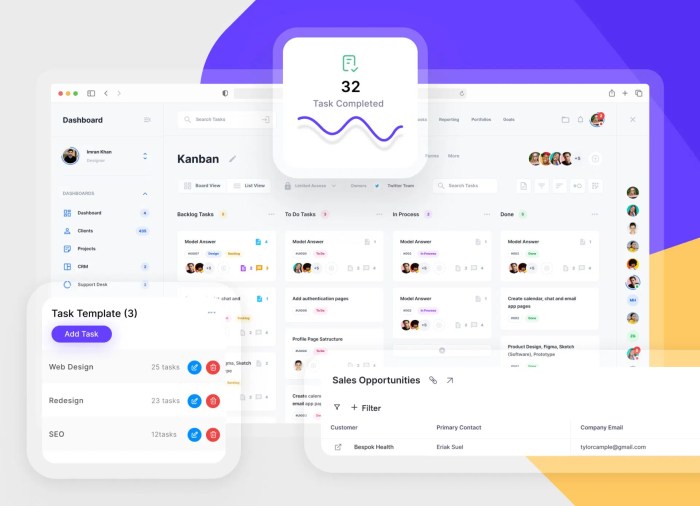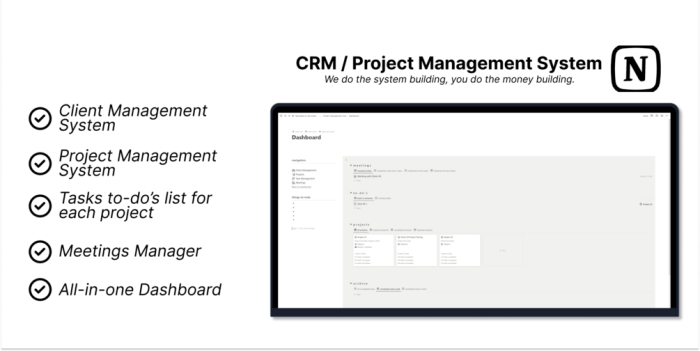Crm and project management software – In today’s dynamic business environment, efficient organization and streamlined workflows are paramount. This necessitates the use of robust software solutions to manage both customer relationships and project execution. While often considered separate entities, Customer Relationship Management (CRM) and Project Management (PM) software are increasingly integrated, offering a powerful synergy to boost productivity and profitability. This comprehensive guide delves into the intricacies of both, exploring their individual functionalities, the benefits of their integration, and considerations for choosing the right software for your business needs.

Source: exactdn.com
Understanding Customer Relationship Management (CRM) Software
CRM software is designed to centralize and manage all interactions with customers and potential customers. This encompasses a wide range of activities, from initial contact and lead generation to sales conversion, customer service, and ongoing relationship nurturing. Effective CRM systems provide a 360-degree view of each customer, allowing businesses to personalize interactions and improve customer satisfaction.
Key Features of CRM Software:, Crm and project management software
- Contact Management: Storing and organizing customer information, including contact details, communication history, and purchase history.
- Lead Management: Tracking potential customers, qualifying leads, and assigning them to sales representatives.
- Sales Force Automation (SFA): Automating sales processes, such as opportunity tracking, forecasting, and reporting.
- Customer Service and Support: Managing customer inquiries, resolving issues, and tracking customer satisfaction.
- Marketing Automation: Automating marketing campaigns, such as email marketing, social media marketing, and targeted advertising.
- Reporting and Analytics: Generating reports and dashboards to track key performance indicators (KPIs) and identify areas for improvement.
- Integration with other systems: Seamlessly connecting with email, calendar, and other business applications.
Examples of Popular CRM Software:
- Salesforce
- HubSpot
- Microsoft Dynamics 365
- Zoho CRM
- SAP CRM
Understanding Project Management Software
Project management software helps teams plan, organize, and execute projects efficiently. It provides tools for task assignment, progress tracking, collaboration, and communication, ensuring projects are completed on time and within budget. Different software caters to various methodologies, including Agile, Waterfall, and Kanban.
Key Features of Project Management Software:
- Task Management: Creating, assigning, and tracking tasks, deadlines, and dependencies.
- Collaboration Tools: Facilitating communication and collaboration among team members.
- Progress Tracking: Monitoring project progress against timelines and budgets.
- Resource Management: Allocating and managing resources effectively.
- Reporting and Analytics: Generating reports on project performance and identifying potential issues.
- Time Tracking: Monitoring time spent on tasks and projects.
- Risk Management: Identifying and mitigating potential risks.
- Document Management: Centralizing and managing project documents.
Examples of Popular Project Management Software:
- Asana
- Trello
- Jira
- Monday.com
- Microsoft Project
The Synergy of CRM and Project Management Software Integration
Integrating CRM and project management software creates a powerful combination, enhancing efficiency and improving overall business outcomes. This integration allows for seamless data flow between the two systems, providing a holistic view of customer interactions and project progress. For example, project managers can easily access customer information from the CRM system to understand project requirements and context, while sales teams can track project milestones to better manage customer expectations.
Benefits of Integration:
- Improved Communication and Collaboration: Streamlined communication between sales, marketing, and project teams.
- Enhanced Customer Satisfaction: Improved project delivery and timely responses to customer inquiries.
- Increased Efficiency and Productivity: Automated workflows and reduced manual data entry.
- Better Resource Allocation: Optimized resource allocation based on project priorities and customer needs.
- Data-Driven Decision Making: Access to comprehensive data for informed decision-making.
- Improved Project Forecasting: More accurate project forecasting based on historical data and customer interactions.
Choosing the Right CRM and Project Management Software
Selecting the appropriate software depends on several factors, including business size, industry, budget, and specific needs. Consider the following aspects when making your decision:
- Scalability: Ensure the software can grow with your business.
- Integration Capabilities: Check for compatibility with existing systems.
- User-Friendliness: Choose software that is intuitive and easy to use.
- Customization Options: Consider the ability to tailor the software to your specific requirements.
- Support and Training: Assess the level of support and training provided by the vendor.
- Cost: Evaluate the pricing model and ensure it fits your budget.
Frequently Asked Questions (FAQ)
- Q: What is the difference between CRM and project management software?
A: CRM software focuses on managing customer relationships, while project management software focuses on planning, organizing, and executing projects. They have distinct functionalities but can be highly synergistic when integrated. - Q: Do I need both CRM and project management software?
A: The need for both depends on your business. If you manage projects for clients or have complex internal projects, project management software is essential. CRM is beneficial for any business interacting with customers. - Q: How much does CRM and project management software cost?
A: Costs vary widely depending on the software, features, and number of users. Some offer free plans, while others have subscription-based models with varying price tiers. - Q: Can CRM and project management software be integrated?
A: Yes, many CRM and project management platforms offer direct integration or can be integrated using third-party tools. This integration significantly improves workflow efficiency. - Q: What are the key benefits of integrating CRM and project management software?
A: Key benefits include improved communication, enhanced customer satisfaction, increased efficiency, better resource allocation, and data-driven decision-making.
References: Crm And Project Management Software
Call to Action
Ready to streamline your business processes and improve customer relationships? Explore the wide range of CRM and project management software options available and choose the solution that best fits your needs. Start your free trial today and experience the benefits of efficient workflow management!
Q&A
What are the key benefits of integrating CRM and project management software?
Improved collaboration, increased efficiency, better client communication, enhanced project tracking, reduced errors, and data-driven decision-making.
How do I choose the right CRM and project management software for my business?
Consider your business size, budget, specific needs, and the level of integration required. Research different platforms and compare features before making a decision.

Source: crmrunner.com
What are some common integration challenges?

Source: gumroad.com
Data migration issues, compatibility problems between different systems, and the need for sufficient training for employees are common challenges.
What is the cost of implementing such software?
Costs vary greatly depending on the chosen software, the number of users, and any required customization or integration services.
Can these systems be customized to fit specific business needs?
Many CRM and project management systems offer customization options to tailor them to specific workflows and requirements.
